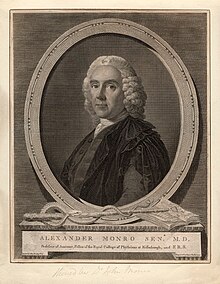Alexander Monro (primus)
| Alexander Monro | |
|---|---|

Alexander Monro primus by Allan Ramsay (1749)
|
|
| Born |
19 September 1697 London |
| Died | 10 July 1767 (aged 69) |
| Occupation | Professor of Anatomy |
| Known for | founder of Edinburgh Medical School |
Alexander Monro (19 September 1697 – 10 July 1767) was the founder of Edinburgh Medical School. To distinguish him as the first of three generations of physicians of the same name, he is known as primus.
Monro was born of Scots parentage in London, and studied there, and at Paris and Leiden. He was appointed lecturer on Anatomy by the Surgeons' Company (now the Royal College of Surgeons of Edinburgh) at Edinburgh in 1719; two years later he became professor, and in 1725 was admitted to the University. He was a principal promoter and early clinical lecturer in the Edinburgh Royal Infirmary, and continued his clinical work after resigning his chair to his son Alexander secundus.
Alexander's father, John Munro took great pains with his education. He had him instructed in the Latin, Greek and French languages, philosophy, arithmetic and book-keeping. After having gone through the usual course at the University of Edinburgh, he was bound apprentice to his father, who was in extensive practice. In 1717 on completion of his apprenticeship, young Alexander Munro (primus) was sent to London to study anatomy under William Cheselden, the famous surgeon who was an enthusiastic teacher and a skilful demonstrator. A lasting friendship was formed between the two men.
To gain as much experience as possible Monro lodged in the house of an apothecary and visited patients with him, and he also attended lectures by Mr. Whiston and Mr Hawksby on experimental philosophy. He made dissections of the human body and of various animals, though his career was nearly cut short owing to a scratched hand being infected by the suppurated lung of a phthisical subject. Monro took an active part in discussions, and in one of his papers first sketched his "Account of the Bones in General". Before he left London he sent home to his father some of his anatomical specimens, and received the encouraging reply that on his return to Edinburgh, if he continued as he had begun, Mr Drummond would resign his share of the professorship of anatomy in his favour.
...
Wikipedia
